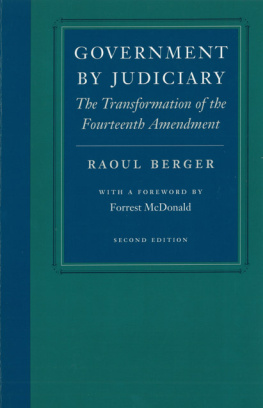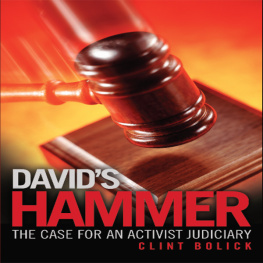Raoul Berger - Government by Judiciary
Here you can read online Raoul Berger - Government by Judiciary full text of the book (entire story) in english for free. Download pdf and epub, get meaning, cover and reviews about this ebook. year: 1983, publisher: Liberty Fund, genre: Romance novel. Description of the work, (preface) as well as reviews are available. Best literature library LitArk.com created for fans of good reading and offers a wide selection of genres:
Romance novel
Science fiction
Adventure
Detective
Science
History
Home and family
Prose
Art
Politics
Computer
Non-fiction
Religion
Business
Children
Humor
Choose a favorite category and find really read worthwhile books. Enjoy immersion in the world of imagination, feel the emotions of the characters or learn something new for yourself, make an fascinating discovery.
- Book:Government by Judiciary
- Author:
- Publisher:Liberty Fund
- Genre:
- Year:1983
- Rating:3 / 5
- Favourites:Add to favourites
- Your mark:
- 60
- 1
- 2
- 3
- 4
- 5
Government by Judiciary: summary, description and annotation
We offer to read an annotation, description, summary or preface (depends on what the author of the book "Government by Judiciary" wrote himself). If you haven't found the necessary information about the book — write in the comments, we will try to find it.
Government by Judiciary — read online for free the complete book (whole text) full work
Below is the text of the book, divided by pages. System saving the place of the last page read, allows you to conveniently read the book "Government by Judiciary" online for free, without having to search again every time where you left off. Put a bookmark, and you can go to the page where you finished reading at any time.
Font size:
Interval:
Bookmark:
GOVERNMENT BY JUDICIARY

This book is published by Liberty Fund, Inc., a foundation established to encourage study of the ideal of a society of free and responsible individuals.

The cuneiform inscription that serves as our logo and as a design element in Liberty Fund books is the earliest-known written appearance of the word freedom (amagi), or liberty. It is taken from a clay document written about 2300 B.C. in the Sumerian city-state of Lagash.
1997 by Liberty Fund, Inc.
This eBook edition published in 2013.
eBook ISBNs:
Kindle 978-1-61487-085-2
E-PUB 978-1-61487-173-6
www.libertyfund.org
For Patty
All persons born or naturalized in the United States... are citizens of the United States and of the State wherein they reside. No State shall make or enforce any law which shall abridge the privileges or immunities of citizens of the United States; nor shall any State deprive any person of life, liberty, or property, without due process of law; nor deny to any person within its jurisdiction the equal protection of the laws.
FOURTEENTH AMENDMENT, 1
Nullius in Verbo
Motto of the Royal Society, London
Take nobodys word for it; see for yourself
Contents


Raoul Bergers original intention, if I may use that phrase in a different way than he does, was not to become a great constitutional historian. Indeed, his work as a scholar is actually the fourth (or fifth, depending on how you count) of the careers he has held during a long and illustrious lifetime.
His first love was and continues to be music. As a youth he studied the violin in New York and Berlin and then went on to make a number of highly praised concert tours, appear as a soloist with the Cleveland Symphony, and serve as second concertmaster with the Cincinnati Symphony Orchestra and first violinist of the Cincinnati String Quartet. But it was difficult in the 1920s, as it is today, to earn a living as a soloist in America, and the drudgery of life in an orchestra began to be numbing to his soul. Accordingly, at the age of twenty-seven, he decided to enroll in college and have a go at making his way in the real world. At thirty-one he entered Northwestern University Law School, and at thirty-four he was ready to hang up his shingle as a practicing attorney.
In 1938, having spent two years in private practice and another taking an advanced degree at Harvard, Berger began his succession of professions in earnest. The first was public service, including stints with the Securities and Exchange Commission and service as general counsel to the Alien Property Custodian and as special assistant to the attorney general. In 1946 he retired from government, and for the next sixteen years he was engaged in private practice in Washington, D.C. Then came yet another calling as a law professor at the University of California, Berkeley, and then at Harvard Law School as Charles Warren Senior Fellow in American Legal History until his retirement in 1976.
In each of these activities Berger achieved considerable distinction, but it was not until he embarked upon his journey as a constitutional scholar that he began rising to greatness. His first book, published in
That finding was scarcely revolutionary, for it coincided with the consensus among students of the founding; but the book was marked by several qualities that characterize all of Bergers later works. The quantity of his research is massive but is combined with pinpoint accuracy in dealing with details. His prose is lucid. He brings to his undertakings a zestful enthusiasm, an indication that he is impelled by a sheer love of scholarshipthe traditional scholarly ideal that the genuine scholar seeks to know the truth for its own sakeand not by the ideological predilections that distort so much historical research. And, in Congress v. The Supreme Court Berger announced his commitment to the ages-old but vitally alive proposition that, when construing a constitution, it is permissible and often necessary to go beyond the text of the document to ascertain, if possible, the intentions of its authors but decidedly not permissible to read into it ideas derived from natural rights dogmas or other external values.
Bergers next two books, as Philip Kurland has described them, were blockbusters, and they won him enthusiastic praise, especially among readers of a liberal persuasion. Impeachment coincidentally appeared in 1973, at just the time when President Nixon was headed on a collision course with Congress, though it was a subject on which Berger had been working for several years. The book focuses mainly on the question of the removal of federal judges, but it is a tour de force of English and American constitutional history. Executive Privilege, which appeared in 1974, is a devastating rebuttal of the argument that the president can constitutionally withhold from Congress or the courts information relevant to the performance of their duties. (Presidents had been withholding such information for some time, but Berger insists that repeated violations of the Constitution do not make them constitutional but merely compound the evil.)
Bergers niche in the liberal pantheon came tumbling down in 1977 upon the publication of the book you are about to read, Government by Judiciary, and suddenly he became a hero to conservatives. His private political beliefs are irrelevant to his work, because he rigorously casts them aside in his research and writing, going wherever the evidence takes him; but it may help the reader if I point out that by and large Bergers predilections have been on the liberal side. He was, after all, a member of the administrations of Franklin Roosevelt and Harry Truman. As he states in the addenda to Chapter 16 of the present edition, his principles are the standard political principles of the moderate left of the Democratic party, but he makes no pretense of identifying them with constitutional mandates.
Bergers personal politics had no more influence on the reception of Government by Judiciary than they had on his writing of the book. What he learned and reported was that for the better part of a century the Supreme Court had been handing down decisions interpreting the Fourteenth Amendment improperly, willfully ignoring or willfully distorting the history of its enactment. More specifically, he found that the authors of the Amendment, far from contemplating a social and political revolution, as defenders of judicial activism maintained, intended only to protect the freedmen from southern Black Codes that threatened to return them to slavery. More specifically yet, Berger found that the two key passages in the Fourteenth Amendmentprivileges or immunities of citizens and due process of lawfar from being vague and elastic, as activists maintained, were terms of art that had precise, well-understood, and narrow legal meanings. Equal protection, a new concept, was identified by the framers with the right to contract, to own property, and to have access to the courts.
The implication was that Brown v. Board (1954, striking down segregation in the public schools), Baker v. Carr
Next pageFont size:
Interval:
Bookmark:
Similar books «Government by Judiciary»
Look at similar books to Government by Judiciary. We have selected literature similar in name and meaning in the hope of providing readers with more options to find new, interesting, not yet read works.
Discussion, reviews of the book Government by Judiciary and just readers' own opinions. Leave your comments, write what you think about the work, its meaning or the main characters. Specify what exactly you liked and what you didn't like, and why you think so.












